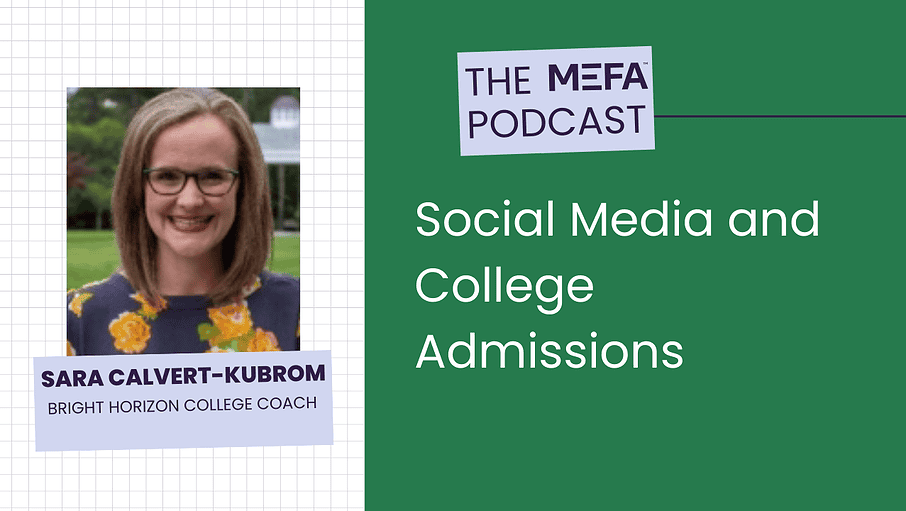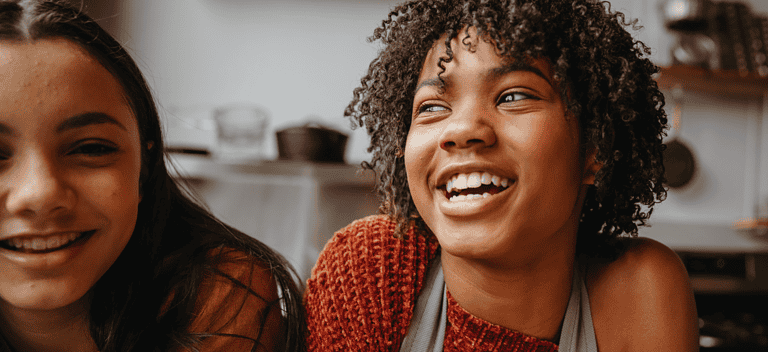

Resources Mentioned in this Episode
Please note that this transcript was auto-generated. We apologize for any minor errors in spelling or grammar.
Jonathan Hughes: [00:00:00] Hi everyone and welcome to the MEFA podcast. My name is Jonathan Hughes and in just one minute you’re going to be hearing my conversation with Bright Horizons College Coach’s Sarah Calvert-Kubrom and we are going to talk about social media in the college admissions process. Some do’s and don’ts, some helpful hints for everybody.
And this conversation was great because it was all new to me and I think it’s going to be full of great information for everybody. Before I send you off to this conversation. I did want to mention that if you have any questions about planning, saving, or paying for college, we do have a bench of college guidance experts waiting to answer those questions.
You can email us at collegeplanningatmefa.org. You can call us at 1-800-449-MEFA. You can find us on social [00:01:00] media on Facebook at @MEFAMa on X at MEFATweets, and on Instagram at @MEFA_MA
Now let’s go to my conversation with Sarah Calvert-Kubrom about college admissions and social media.
A lot has changed since I applied and went to college. And the first thing that comes to mind, obviously, is the internet. I went to school pre-internet, not really pre-internet but, in the early days, let’s say. But especially, of course, social media. Now I know that this is important. And this has changed everything about life.
So naturally it would have changed college admissions But I can’t talk about it because I’m a luddite as far as these things are concerned. So I have a guest on to help me today. She wrote a blog for us on this very topic on college admissions and social media, and we’ll link to that, but her name is Sarah Calvert-Kubrom.
Sara Calvert Kubrom: It’s Kubrom, but you were very close. You’re [00:02:00] good.
Jonathan Hughes: And she has held a variety of positions in higher education, advising students and planning academic events at Boston College. Being the lead administrator of the Northeastern University in program, which is the freshman study abroad program, she collaborated with the admissions office on all student enrollment initiatives and oversaw student and professional staff in five countries.
And more recently, Sarah was an admissions officer at her undergraduate alma mater, Lewis and Clark College in Portland, Oregon. While working at Lewis and Clark, she managed the college’s admissions decision release process. And she holds a Bachelor’s in Hispanic Studies in Sociology and Anthropology from Lewis and Clark College and a Master of Social Work from Boston College.
Sarah, thank you so much for being on the show.
Sara Calvert Kubrom: Thank you for having me. And whoa, that is something to hear said out loud. Thank you.
Jonathan Hughes: You could [00:03:00] just mention, because I didn’t mention this, but if you could say where you are now and what your role is now.
Sara Calvert Kubrom: Oh, of course. So I work for Bright Horizons College Coach. And one thing we were chatting about is that right. Horizons headquarters is in Massachusetts. But what I love is our team works remotely all over the country and our entire team are. Admissions experts, so past college admissions officers like myself that bring that perspective to the work that we do or college finance experts who are also past college financial aid officers, financial professionals, and we coach and mentor families through the college admission and financial aid process. And one thing I love about the fact that we’re remote and all over the country is that brings a beautiful diversity of experiences, the types of universities and colleges we’ve worked at, public, private, small, large, you name it.
Jonathan Hughes: Let’s talk about some of the ways that students can use. social media to connect with colleges [00:04:00] and to demonstrate interest.
Sara Calvert Kubrom: Yeah, so people often are asking about that, the last word you said, demonstrate interest. How do we show colleges that we’re interested? Rather than thinking about for the most part, social media as a way to demonstrate interest in terms of something that colleges are quantifying and really, putting into the applicant file.
It’s rather a more, it’s a research tool. It’s a really powerful research tool to learn about colleges. Now, would I say that it doesn’t hurt to, like a post or engage. No, go for it. And they may notice. But for the most part, demonstrating interest in the formal sense that some colleges track is going to be more through clicking on their formal website, going to a campus tour, be it online or in person, a college fair, talking to a college admissions officer when they visit your high school, etc.
I’d say that social media is really an [00:05:00] opportunity that in a beautiful way is different from when you and I went to college where I was just looking at the guidebooks and reading the descriptions from my living room that, these colleges can come to life and they can give you videos and photos and help a student who, let’s be real: in our busy, expensive lives can’t get to every college in person that they’re thinking about can have the colleges pop out of the screen and “say can I see myself there?” What do I like? And there are a lot of ways and examples, and if you want, I can break down some examples by some types of social media and the way that I’ve seen it. Would that be helpful?
Jonathan Hughes: I would love for you to do that.
Sara Calvert Kubrom: The one that I’m hearing the most about with my students right now is Instagram. And this is something that has shifted a bit from when I was in Admissions. It used to be more Facebook, and I’d say that now it’s shifted generationally to Instagram.
Instagram is such a great way for quick consumption of pictures and posts and students are following along. Students are really excited about Instagram. I think [00:06:00] it’s an easy way to engage students colleges often have broad university or college wide Instagram accounts as well as office of admission one.
And it’s good to follow both because the broad university one might give, campus events and happenings. The admissions one might give announcements of important admissions events, reminders of deadlines, different insights into things. One thing that students I’ve worked with love is that a lot of students who visit.
These colleges and universities or current students at them will use the geo tag feature to tag the location on campus where they do something or a cool picture is taken. And so students that they do go visit can look at those tags and be like, “Oh, I want to go see these places in person.” So sometimes it’s a tool.
Just from afar, to go, take the place of an in person visit. And on the other hand, students can make their in person visits a bit more personal, a little bit more rich and not just doing the [00:07:00] formal campus tour and visit, but rather looking at where are these real humans that have been at these places?
Where did they tag? Now let me go find it. So I think that there’s a lot of potential and fun ways to use it. So Instagram. I also would say that YouTube saw a big uptick since the pandemic because in the absence of in person campus tours early in the pandemic, there’s now been a persisting desire to make college visits more accessible because they are expensive, they are timely, they are logistically complex.
We also are hearing a lot of concern of the learning loss. That has happened in the last few years and students not wanting to miss school. So let’s amplify these online opportunities and YouTube has had a great way for colleges to post the videos of events, tours, happenings on campus. So a lot of times you’ll see YouTube videos either embedded on college websites or YouTube channels directly that you can go find.
Sitting back can [00:08:00] be really helpful. There has been a gradual dabble and increase that started with skepticism, but has now pivoted to using tick tock for videos. And colleges will have student ambassadors sometimes do takeovers of Instagram or tick tock and make videos. Sometimes it’s just silly, fun campus camp happenings, but sometimes it’s a video about a specific event or program or department or major. So although TikTok isn’t universally used, I would say that it’s growing in its use by colleges. And I think it’s relatable to the students who are using it right now. I did reference earlier that it used to be more Facebook now, not so much.
However, I would say that Facebook is still used. And one of my colleagues who did some research on this topic calls Facebook, if you think about it a little bit more scholarly or professional, it’s often the official face of a college or university. They might have a official marketing page.[00:09:00]
They might have their specific majors, departments. Where offices of admissions still use them a lot. And this is one of the big takeaways. I really want to drive home on this is a lot of times admitted students are invited to join locked private Facebook groups for admitted students. And Facebook really still is the one that has the best platform for that, where students can be in a locked private group, the college can give them information about them. Maybe you meet your future roommate. You engage while you’re deciding where you want to go. So Facebook still is in the mix. I think that it just is a diversity of ways these platforms are used.
Jonathan Hughes: And how would they let these accepted students know? Would that be in a message through the portal?
Sara Calvert Kubrom: Yeah. So usually after students are admitted, colleges will follow up with email through the portals, et cetera with ways to engage with the colleges. So it might be an open house that they’re hosting for admitted students.
It might be links to their social [00:10:00] media presences. A link to then go and request to join some of these locked groups for admitted students. And I’ve worked with quite a few students in the last few years that it’s their moms who have Facebook and sorry, not to generalize about dads, but that’s just what I hear.
Jonathan Hughes: I thought you were going to say versus. Students, but moms, yes, but okay.
Sara Calvert Kubrom: And I’ll own, I actually manage by Horizon College Coach’s Facebook page. And I’m a middle-aged mom and I use Facebook, so I’m going to own that demographic. But I have had a few students decide to sign up for Facebook just for the purpose of those admitted student groups.
And I think colleges I keep hearing from colleagues and friends are trying to think of a replacement for that, but it’s not always. Simple. So I think they’ve continued to use them for that purpose.
Jonathan Hughes: I’ll be honest when I first started to have the idea for this episode. It was out of a sort of negative impulse, right? And because I had heard something an ad for something on the radio that said, you know If you’re applying to college or isn’t make sure your social media profiles clean, etc. [00:11:00] Are there any do’s and don’ts when respects to admissions whether it be that informational side or more of the making yourself attractive to colleges. Are there any general rules of thumb here about what to do and what not to do across your social media presence for the most part?
Sara Calvert Kubrom: College admissions officers have to read applications at rapid speed, really fast. Most times, when I read applications, I was not going online and Googling that student or pulling up their social media page.
There’s no time. However, it’s not to say they couldn’t. What if there was something concerning in the letter of recommendation or some kind of red flag or the committee says, ha, we need to see what else is there. What I would say is that. As a person who’s not only been an admissions counselor and now admi admissions co- sorry, admissions officer, and now admissions counselor, and someone who has supervised a lot of young professionals in their 20s in my career, [00:12:00] is that this is the time in life in high school to start really thinking thoughtfully about how we present ourselves publicly.
And will these things come up in the college admissions process? Maybe not, but they could with a interview process for a college internship for a future job. And so what I’d say the first thing to do is take an audit of all online presence and see what’s public versus private. So you can do a online search of yourself.
You can have someone who’s not your friend or contact try to look you up and see what they can see versus someone who is. I’d start with a privacy audit and see what you’re posting. for your friends versus publicly. I’d also think really thoughtfully about how the images, photos, what they can portray.
Now, not to get awkward, but does a minor have a beer in their hand in a picture? The way people dress, it’s not to say that you censor and not your authentic. Self. But [00:13:00] is this the way you want an admissions officer, a vice president of enrollment, a future employer to see your, to see you? So I think about it from that lens.
I’d also think about posts. Now. We have beautiful rights around freedom of speech in this country, and we want to be thoughtful and cognizant that colleges are community builders and they need people to be safe, and they need people to be respectful and thoughtful on the way they engage with community Again, colleges may not see any of ours are, engagement or profiles and social media, and I think it’s helpful to be thoughtful and careful.
Jonathan Hughes: That’s great. And one other thing that we were talking about internally is specific types of students and how they may use social media. So athletes, for example, and I know communication. Between athletes and coaches, there is a certain resource that is used for that. Are social media channels ever used to promote games or let people know? And then [00:14:00] also the other type of student we were talking about are artists with their portfolio’s going to art schools or audition reels or things like that. So are those things that you see used for social media?
Sara Calvert Kubrom: Yeah. So athletes, I would say absolutely yes. And a bit more. And this is where I did crowdsource with our team because I worked with coaches and recruitment a lot when I was at Lewis and Clark, but times change and now I’m working with athletes.
And it’s versus the coaches. So I wanted to get an updated sense and I got a resulting yes, from colleagues and we did last year from a training we did internally as well, especially Instagram. So most teams and athletic departments have Instagram pages so you can use that to follow them. Some coaches will welcome private messages through that way as a form of communication.
That should not, however, take the place of going to their website and filling out their recruit forms and the other formal communication, but that is there. The [00:15:00] flip side of it is increasingly it is become pretty expected and normal for athletes who are going to be engaging in the recruitment process to have Instagram pages that can be their kind of athlete page.
And what one of my colleagues who does this professionally, but it was also a mom of high school athletes, is that her boys have. Instagram pages for their sport, and it’s mostly about their sport. It can be content about tournaments, accomplishments, et cetera. And what she recommended, which I thought was spot on is to sparkle a little bit of real life in there because coaches are looking for the human.
They want a positive member of a team because it is your home away from home and your school family. So maybe, a post about a family vacation, maybe about a volunteer activity you go to, something that shows some other part of who you are as a person, but not the random beach selfies and all the other things, maybe having two accounts, one [00:16:00] that’s for all the personal selfies, et cetera, and one which is really intended for the athlete journey, but sprinkling in a little bit of authentic non-athletic life in there as well.
Yes, and that has shifted a little bit in the last few years because it used to be more that, as you mentioned, each sport, a lot of them have online platforms and things that you can be a part of to show clips and videos. Those still exist, and those still are can be important. And I’d say students should follow the instructions of the coaches that they’re talking to, and Instagram in particular has become a really powerful tool for learning about teams and following them and then also for coaches to follow the high school athletes that they’re recruiting. Yeah. Art? Do you want me to talk about that?
Jonathan Hughes: Yes, please.
Sara Calvert Kubrom: So I have worked over the last several years with several artists, but also performers, dancers, etc. And, my gut, and I got this verified, but from a colleague who works at, worked at an art school [00:17:00] recently, is that social media is at this point not so much used by art and talent based programs because they have intentionally very structured and consistent platforms for how they review portfolio’s or interviews or auditions, and they’re receiving materials in very specific ways.
However, I will add that most of my art and performing arts students have had pretty robust Instagram in particular presence as a way to, build followers, to show their work, to often network within the art community, which then builds more exposure and opportunities. So I would say that social media, Instagram in particular, seems to be really powerful for a lot of my high school artists, but it’s not usually going to be a concrete part of the process from what we’ve seen thus far in the way that it does seem to play a more concrete role in athletic recruitment.
Jonathan Hughes: Does it [00:18:00] hurt if a student doesn’t have any? presence at all.
Sara Calvert Kubrom: It’s so funny. I was preparing for this and I was telling my husband and he asked me that without even seeing your questions. He was curious. What I would say is no. There are plenty of teenagers who are also cognizant of some of the risks, benefits of online public presence.
And I think starting to think about this and I increasingly do encounter students that are not engaging in this space, I’d say that no, it won’t really hurt. I would, however, encourage students to think as emerging adults about other things like linked in and other ways to have an online presence of things that might be searchable anyway for professional development.
What I often have found, as I mentioned earlier, though, is a lot of my students are creating like a Facebook account just so they can, be part of those admitted student groups and other places. So I’d say that. Is it going to raise a red flag or be a concern? Absolutely not. But it might more be that students are missing out [00:19:00] because a lot of colleges are putting announcements and events and things that benefit perspective students, so they’re going to have to.
Be a bit more persistent and following websites and more traditional emails, phone calls, et cetera, and they may just miss out on things that their peers are seeing. So it’s not going to paint any negative picture about them. But I think it could be more that they’re missing out some of these ways that colleges are quickly releasing content and information
Jonathan Hughes: Before we go is there any piece of advice you’d give to any students regarding social media or just college admissions in general?
Sara Calvert Kubrom: I think I’m going to end this on a little bit of a downer, but the thing that I saw in my career and that a lot of my colleagues also brought up, the only cautionary tale that I have seen a bit more with social media is once a student’s admitted, as I mentioned earlier, they can join these groups quite often for admitted [00:20:00] students.
I have seen in rare cases, not often that, sometimes students in those spaces are excited to meet their peers, but then they may behave in ways that are not intended to happen like they are going to be the one that hosts a party at the admitted student weekend when they’re on campus or engages in illegal activity or hate speech or something that really shouldn’t be happening and then the offer of admission can be rescinded. This is rare, but it happens so-
Jonathan Hughes: I was going to ask you about that.
Sara Calvert Kubrom: Yeah, because I’ve heard of offers being rescinded. Yeah, but I was thinking of was you know, a College admissions officer looking for something and finding it but you’re saying it doesn’t usually happen that way it’s when After they get in, and they’re very something, some kind of, overt misconduct that is not being is being done overtly in a public space, like a, admitted student Facebook group or something like [00:21:00] that oftentimes admissions offers are rescinded for pretty a big reason.
So the colleges take that pretty seriously. The most common is, let’s say a student’s been an A/B student through all of high school and spring of senior year, they’re suddenly getting all C’s or D’s and the colleges all get their final high school transcript. That is the most common reason.
Still not common, but that is the one I’d say comes up the most. But student behavior, be it online or in person, maybe they go and spend the night on campus at an admitted student event and break at campus policy. That absolutely can be a reason for having to meet one on one with the vice president of enrollment, which is intimidating regardless.
And possibly having the offer of admission rescinded because they are taking very seriously, the type of community that they’re trying to welcome to campus the following fall. And so I think that is where I would encourage thoughtful engagement and caution. And I think that [00:22:00] sometimes, on a computer, there’s this distance where maybe there’s a instant gratification, a quick moving mind.
That we don’t pause and rethink the way that we may when we’re face to face in person with someone. And I think that is a generational shift that I also see is that, when you do things quickly, I think that maybe we’re not slowing down and thinking, If I were face to face talking to this person, what would I do?
And I think that is the area to be careful. I would not go around being paranoid that colleges are watching people in general, but I think that. Making sure that whatever we do online is a reasonable reflection of the type of human being that we are, of our values, and the energy that we’ll bring to whatever college community we join.
Jonathan Hughes: I loved every minute of this because I learned so much. Sarah, thank you so much.
Sara Calvert Kubrom: It was great to chat and have a good rest of your day, okay?
Jonathan Hughes: I want to thank Sarah Calvert-Kubrom for being here. That was really great. I hope she comes back [00:23:00] again to talk about something else. Folks, if you liked what you heard on the show today and you want to hear more for us, and you want to hear more from us on planning, saving, and paying for college?
You can follow the show wherever you get your podcasts, and please remember to review us because it does help us to keep doing what we’re doing and getting the show out to folks like you. I want to thank our producer Shaun Connolly, I want to thank AJ Yee and Lauren Danz for their assistance in getting the show posted.
We’ll be back soon with me and Julie on another episode of the MEFA Podcast. Until then, my name is Jonathan Hughes and this has been the MEFA Podcast. Thanks.












